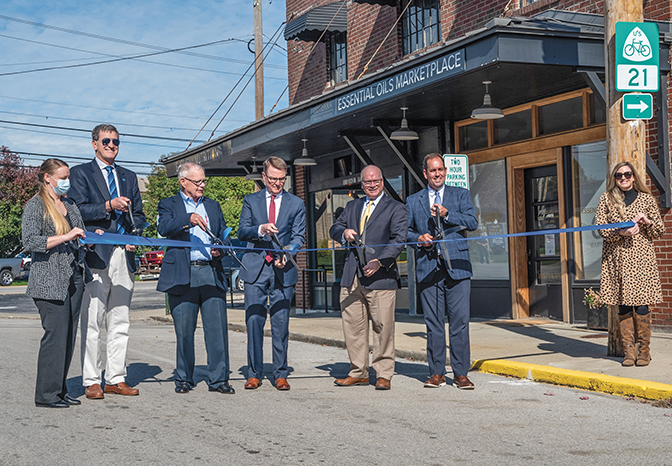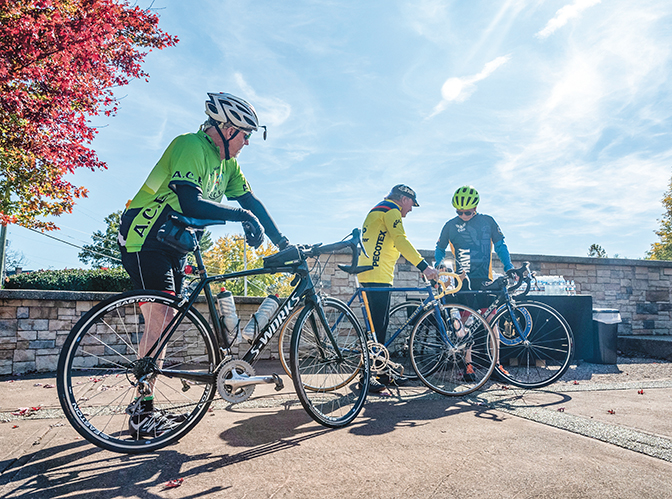When state and local officials gathered in Berea last November to celebrate the completion of a four-month project identifying Kentucky’s new Daniel Boone Bike Route 21 (USBR 21), the project represented much more than a culmination of a state and local partnership. The USBR 21 project also represented 15 years of work by Dr. Peter Hackbert and Berea College’s Entrepreneurship for the Public Good (EPG) program students.
“Entrepreneurship is about creating value,” Dr. Hackbert said. “It’s about recognizing the hidden gems—the small independent businesses in the tourism industry that provide authentic, unique services and amenities. These are the real valuable assets that are unique to Kentucky.”
Five years into the program’s 20-year history, Hackbert became director of EPG, which is just one program to support Berea College’s Appalachian commitment.
“In the first summer, we learned about being respectful of Appalachian traditions, teamwork and social innovation with community partners for the region,” Hackbert said.
And with that, from Day One, observation has been key.
“Entrepreneurs observe,” Hackbert said. “We kept seeing these people ride through Berea on their bikes. We would talk to these people at Berea Coffee and Tea, and they reported to us about their long-distance cycling experience in eastern Kentucky. They said it was beautiful, friendly and safe. They said they experienced hospitality they could not experience in Seattle, Chicago or Indianapolis.
“We kept seeing these people,” Hackbert continued. “And because they told us about the beauty and the hospitality in eastern Kentucky, we moved our work to mapping cultural assets. We took culture, art and food and linked that into adventure tourism.”
And doing this 15 years ago put EPG in the forefront of the adventure- tourism movement, Hackbert said.

“We were so far ahead,” he said. “We identified it. But it’s not about us identifying it; it’s about whether the community knows. If the community doesn’t embrace it, we are doing it to them. And EPG isn’t about doing it to them. We are doing it with them. If the community doesn’t know, they don’t know how to benefit.”
Each EPG class—called a cohort—builds on the work done by previous cohorts. Each summer, previous cohort students have an opportunity to come back and share their experiences with the new class, allowing the learning experience to continue even after a student completes the program.
There are no other programs that integrate entrepreneurship and Appalachian issues in the southern region,” Hackbert said. “I’m a social entrepreneur. We make things up. There are other trail systems that have created economic benefit for the state, county and city. But nobody is doing it quite like we are in that it’s student driven. The students must learn
entrepreneurship and entrepreneurial leadership. They have to walk out with a stronger skill set and knowledge set than when they entered.
Ani ’22, a fifth-year senior with a double major in business and Spanish who was a member of cohort 17, said she developed both personally and professionally from the EPG program.
“I knew very little about entrepreneurship before doing EPG,” Ani said. “Now, I have the skills, tools and mindset to be an entrepreneur. Now, I’m thinking I am going to become an entrepreneur. But even without becoming an entrepreneur, applying the entrepreneurial mindset to everyday situations will be useful.”
Ani said learning about the entrepreneurial mindset was “something.” Included in that mindset is the idea of creating a personal board of directors—a group of individuals students can rely on to act as a sounding board for professional development.
“I learned about brainstorming ideas and being confident in your ideas,” Ani said. “I learned about identifying a personal board of directors in your life to help make your ideas come true—to help you realize your ideas. I had no idea you could do that, but EPG taught me.”
Additionally, Ani said she learned about “being comfortable with ambiguity and making the most out of it.”
Ani says she has a passion for learning foreign languages—she’s on her third language now. She is thinking of opening her own language school, perhaps in her home country of Armenia, in the future.
In the meantime, Ani hopes to use the skills she has learned to help her father grow his existing business in Armenia.
“EPG focused on Appalachia and how entrepreneurial actions would affect Appalachia,” she said. “My home country is similar to Appalachia in terms of socioeconomics.”
Julia ’23, a Lexington, Ky., native who is a double major in music and business administration with a concentration in accounting, was also a member of cohort 17—the first cohort impacted by the COVID-19 pandemic. Cohort 17 and 18 were completed remotely, with students meeting via Zoom and conducting interviews virtually as well. Cohort 17 made the experience their own, Julia said, and continued their important work.
“My group project was focused on looking at the economic impact of different industries, and we did it looking at ATV (all-terrain vehicle) trails,” Julia said. “We focused on how these trails made their communities profitable. We found four business sectors—food, gas, entertainment and lodging. And we looked at how to implement a trail here in Kentucky.”
The next cohort took that information and applied it to what would become USBR 21.
“Biking is a pretty accessible activity,” Julia said. “Having a bike isn’t a terribly crazy ask. A lot of people growing up have bikes—it’s not terribly expensive to get a bike. And a bike route isn’t something you can only bike on. It’s something you can walk or run on and enjoy other ways.”
Roshan ’22, a student from Nepal majoring in business with a concentration in marketing and finance, was a member of cohort 16 in 2019. He came into the program with the goal of being an entrepreneur and joined the program to help him reach that goal.
“A lot of the work we did was the marketing side of the bike route,” Roshan said. “The main purpose of the bike route was to bring people into these small towns and make sure they spend money in local businesses, so revenue is generated and the economy grows. We looked at the populations, small businesses and what they are doing to draw in bicyclists. By the end of that summer (2019), the state officially recognized the bike route as a national bike route.”
“When your town is in a state of economic crisis, there’s very little they can do,” Roshan said. “Using adventure tourism to bring people in is very interesting.”
Roshan also wants to eventually start his own business, and he said the skills he learned working on the bike route through EPG will definitely help.
“Dealing with ambiguity and uncertainty, and having a board of directors in your life—those were two of the main lessons I learned in the program,” he said.
When he began as director of EPG, Hackbert said he had no idea the group would end up with a national bike trail. But again, that is part of the process of entrepreneurship, he said.
This summer, cohort 19 will again meet in person, studying entrepreneurial ecosystems in four communities: Chattanooga, Tenn.; Berea, Morehead and Hazard, all in Kentucky.
“Entrepreneurs have a vision, and they move into the vision,” Hackbert said. “Working with ambiguity and uncertainty is one of the skillsets students learn. They walk out with a different mindset. It’s about getting it done. It’s about starting with the end in mind. It’s about being effective in their communication, teamwork and building trust and respect. Those behaviors have been recognized by the faculty and administration at this College. That’s why EPG is so respected.”



[…] expected to go to such a college. One remarkable project they’ve accomplished is designating a bike route that passes through Berea on the way from Atlanta to Cleveland. Their work has stimulated the […]